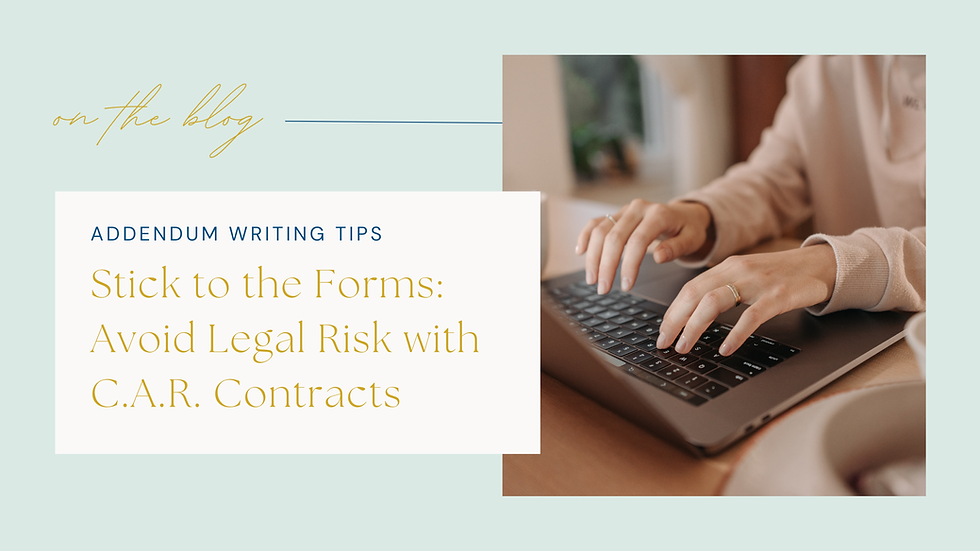Stick to the Forms: Avoid Legal Risk with C.A.R. Contracts
- Paperless Transactions
- Oct 10, 2025
- 2 min read
In California real estate, agents walk a fine line between facilitating a transaction and practicing law without a license. One common area where that line can easily be crossed is when writing addendums. While it may seem harmless to draft a few extra paragraphs to “clarify” a deal, agents must remember that they are not attorneys—and lengthy, custom-written addendums can create serious legal exposure for both the agent and their client.

The Role of the California Association of REALTORS® (C.A.R.)
The California Association of REALTORS® (C.A.R.) employs teams of attorneys whose sole purpose is to create, update, and maintain standardized contract forms—such as the Residential Purchase Agreement (RPA) and its various addenda. These forms are carefully written to reflect current California laws and court rulings. They are tested, vetted, and continually refined to protect both buyers and sellers while ensuring compliance with state regulations.
By using these approved forms, agents can confidently operate within the legal boundaries of their license, knowing that the language has been professionally drafted to withstand legal scrutiny.
Where Agents Get Into Trouble
Problems arise when agents attempt to “help” their clients by drafting long, detailed addendums in their own words—often in an effort to explain a unique situation or to make a deal work. The issue is that once an agent begins creating or interpreting legal language, they’re stepping into the territory of practicing law, which is prohibited under California Business and Professions Code §6125.
Even well-intentioned language can:
Create ambiguous or conflicting terms that contradict the RPA.
Introduce unintended legal obligations or liabilities.
Invalidate parts of the contract altogether.
Expose the agent to disciplinary action, legal disputes, or E&O insurance claims.
Stay Within the C.A.R. Forms
C.A.R. provides a vast library of forms designed to address nearly every scenario in a residential transaction. Before drafting a custom addendum, agents should first look for an existing form that fits the situation. If you don't know the appropriate form to use, I encourage to reach out to your Broker.
Each of these has been drafted by legal professionals and includes language that integrates smoothly with other contract provisions.
When Something Truly Unique Arises
If a situation arises that genuinely cannot be covered by existing forms, agents should consult their broker, legal counsel, or C.A.R.’s legal hotline before putting anything in writing. It’s far safer to have a qualified attorney draft the necessary language than to risk an unenforceable or misleading agreement.
The Bottom Line
Real estate agents are skilled negotiators, communicators, and transaction managers—but they are not lawyers. Relying on C.A.R. forms and professional legal guidance protects everyone involved in the transaction: the agent, the broker, and the client.
When in doubt, keep addendums concise, stick to standardized language, and remember—clarity and compliance are always more valuable than creativity when it comes to contract writing.





Comments